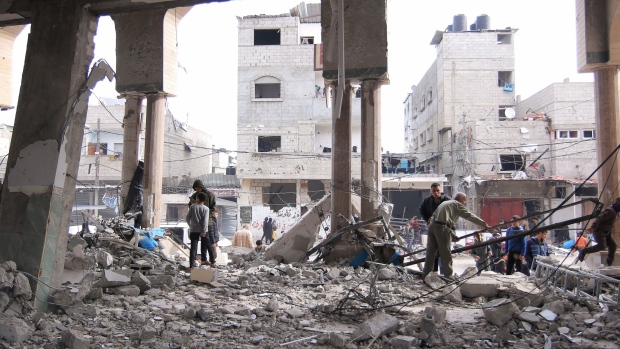Feb 21, 2024
Global Conflicts Turn Sleepy G-20 Forum Into High-Stakes Affair
, Bloomberg News

(Bloomberg) -- The international outcry over Brazil comparing Israel’s actions in Gaza to the genocide during World War II has turned a typically sleepy gathering of Group of 20 foreign ministers into a high-stakes affair.
The world’s top diplomats are meeting in person in Rio de Janeiro for the first time since Hamas’s Oct. 7 attack on Israel sparked a full-blown conflict and Germany’s foreign minister Annalena Baerbock came in unequivocally. She was asked about President Luiz Inacio Lula da Silva drawing a parallel between what is happening in the Gaza Strip to the Nazi extermination of Jews during the Holocaust.
“The Holocaust cannot be compared to anything,” she said before walking off.
Her words immediately set the tone for what will be a tense meeting, one that will also put US Secretary of State Antony Blinken and Russian Foreign Minister Sergei Lavrov together just as the war in Ukraine completes its second year — and as the Biden administration prepares “major” new sanctions over the death of opposition leader Alexey Navalny in a maximum-security prison.
The Rio meeting, as a result, has become a significant test of the G-20’s ability to serve as an effective global forum, and whether the group can still find consensus on pressing economic and environmental issues even amid its deep foreign policy disagreements.
The G-20 formed more than two decades ago to bolster economic and financial cooperation among the world’s largest nations. Since Russia’s Feb. 2022 invasion of Ukraine, however, the conflict has dominated the global agenda, reshaping approaches to the economy, environment and international cooperation.
Brazil assumed the group’s presidency desperate keep war from overshadowing the rest of its priorities, including Lula’s push for major climate action and reforms to global governing institutions like the International Monetary Fund and United Nations Security Council to make them more representative of Global South nations.
The explosion of another major conflict, however, has threatened to paralyze the group from the start, and the forum may now be forced to avoid geopolitical issues altogether in order to keep discussions on other subjects on track, according to officials familiar with the matter.
“The challenges are natural,” Brazil Foreign Minister Mauro Vieira told reporters in Rio on Tuesday, projecting confidence about the group’s ability to make progress. “These difficulties will be addressed throughout the year, at the different meetings of the G-20.”
Read More: Israel-Hamas War Splits G-20, Risking Paralysis at Meeting
Several other crises hang over the gathering, including ongoing efforts to prevent Venezuela’s dispute with Guyana over the oil-rich Essequibo region from escalating into an armed conflict. The US and other nations are also attempting to ensure free and fair elections in Venezuela, after the leading opposition candidate was barred from running. And the foreign ministers are slated to hold discussions about a possible Kenya-led security mission in Haiti in an attempt to stabilize the nation.
Lula on Wednesday held a one-on-one meeting with Blinken in Brasilia, a day after the US vetoed another UN Security Council resolution calling for a cease-fire in Gaza. The US is instead pushing an alternative resolution that warns against an Israeli assault on the city of Rafah while calling for a temporary cease-fire.
Brazil has explored strategies to keep the wars from derailing the rest of the agenda, including the possibility of issuing a single statement at the end of its presidency in November, rather than after each ministerial meeting.
Brazilian officials also argue that the complex global landscape has made its G-20 presidency and the reforms it will propose all the more urgent.
“A time of major crises calls for more reform,” said Mauricio Carvalho Lyrio, the secretary for economic and financial affairs at Brazil’s foreign affairs ministry. “I know it’s more difficult, but at the same time, the need to move forward on these issues means that we have to act, because the deterioration in terms of geopolitical conflicts is evident.”
--With assistance from Courtney McBride.
(Recasts first paragraph, adds comment from Germany’s foreign minister in second and third paragraphs.)
©2024 Bloomberg L.P.








